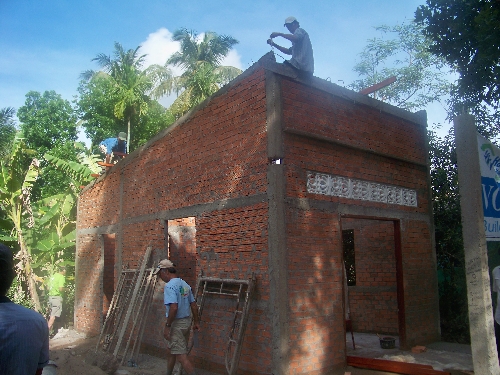Veterans’ squad mentality builds a house in Vietnam
The current political and economic climate? A piece of cake, said Dick Moyer, a Vietnam vet who clearly remembers the turmoil of the 1960s and '70s.
"That was a terrible time for everyone, the most divisive time I've seen in my lifetime," Moyer said. "But we survived, didn't we? And we will survive this time, too."
Moyer, 65, has worked hard to put the memories of the Vietnam War behind him. He promised himself that his raw Army experiences, which included three Purple Hearts, wouldn't taint the rest of his life. He went on to successful careers with Westinghouse and Air Wisconsin Airlines Corp., and now works as a transit supervisor for Veolia Transportation in Las Vegas.
However, when he talks about a recent return to Vietnam, tears well up in his eyes.
"But these are tears of joy," he explained. "We left Vietnam the first time amid blood, sweat and tears. We left this time amid laughs, sweat (because of the heat) and tears of a different kind."
Moyer and Richard "Doc" Small, another Vietnam vet and Purple Heart recipient from Las Vegas, returned to Vietnam for two weeks in April. They were two of 30 volunteers on a Habitat for Humanity project to build three homes in rural Tien Giang province, in the Mekong Delta region of southern Vietnam.
Small, 72, heard about Habitat for Humanity's Global Village Volunteer Program going to Vietnam in July 2011, while he was attending a Vietnam Veterans of America meeting in Reno. He knew immediately he would volunteer.
Small had been an Army physician in Vietnam in 1968-69. He saw and treated war injuries, and the memories of Vietnam remained with him through a 20-year career in private practice in California.
"I was just burned out as a physician," he said.
So, he took early retirement and went on to work with the homeless at a rescue mission. He found great satisfaction with the work, which brought him into contact with a number of Vietnam veterans.
He moved with the mission to Las Vegas in 2004. Here, he met another volunteer, Shirley Westover, with whom he fell in love; the two are to be married later this year.
"Both of us have a need to be helping others," Small said, "so the idea of returning to Vietnam was something I had to do, and, of course, Shirley understood."
Small and Moyer had met at Las Vegas meetings of the Military Order of the Purple Heart. Moyer had moved to Las Vegas in 1998.
When Small announced he was going to Vietnam with Habitat for Humanity, Moyer was interested. He had been in kill-or-be-killed situations in Vietnam for 13 months . He wanted to change the picture in his mind's eye. His wife, Patty, agreed.
Both men were required to fund the project with $1,700, which paid for room and board for two weeks in Vietnam. They also paid their own plane fare. Moyer was helped by members of the Holy Spirit Lutheran Church and Thrivent Financial for Lutherans.
Once in Vietnam, the American and Canadian volunteers, 16 of whom were Vietnam War veterans, were divided into three teams. Moyer and Small were on a 10-person team building a two-room brick residence for a woman named Thuy and her two children. Thuy was part of the build team as well.
"The temperature then was 90 degrees with 90 percent humidity," Small said. "Among our 30 people, two had heatstroke the first day. After that, I became the doctor again, calling all the breaks and making sure the groups had water.
"Initially, our group supervisor told us he was stunned at seeing so many 'old guys' and wondered if the homes would ever get built. But we had the squad mentality, with a goal and looking out for each other. We hauled cement, rocks and bricks ... 8,000 bricks for our home alone ... climbed scaffolds and got the job done in 9½ days."
Three homes were built despite primitive conditions in the rural area. As one Habitat for Humanity blogger wrote, "Cement mixers and most other tools that would be at your disposal in the states are not available here. We cut bricks in half by holding a short piece of rebar against the brick and striking it with a hammer. A wet saw would be a luxury, except there is no electricity."
Moyer is particularly eloquent when talking about Vietnam today as a beautiful, vibrant country whose young population is on the move.
"The Vietnam government is communist, but the government is not getting in the way of progress," he said. "Habitat worked with the government on this project, and we were even featured on a television segment filmed by a national new agency out of Hanoi."
Small said, "We won the peace, in terms of introducing a new way of life to Vietnam which they are pursuing. Nonetheless, on our trip, we also saw some very primitive conditions that make one very grateful for all that we have."
Thuy's husband was killed eight years ago. She and her children had been supported by relatives but were living in a dwelling that looked as if a stiff wind would destroy it, according to the men. Her late husband's sister came to the construction site to watch progress on the new house.
"She stood and watched and cried," Small said.
Moyer said, "We also took up a collection among ourselves to help Thuy build a another room on her home after we left, a water closet. We collected $500 and gave that money to a government representative. The money was used by Thuy to build the final room and finish some tiling."
They also gave the family a number of gifts for which they were very grateful.
"You should have seen those smiles," Small said. "Thuy works as a seamstress and earns just $1 a day, so $50 worth of gifts was like a godsend."
Next year, Habitat for Humanity hopes to have another build project in Vietnam, this time with 100 veterans participating. Small said he will be among the builders and is bringing one of his sons. Moyer will be going with his brother.
If an ad were needed for next year's Vietnam trip, Moyer's final remark may be all that is needed:
"While I was there building a house, I was also building a place to put away the pain and bitterness of the Vietnam War."

















